Easter is just around the corner and there’s nothing more impressive on your dinner table than a beautiful Lamb Roast. Today, I’m using a Boneless Lamb Leg and I’ll show you step by step just how easy it can be to make fall apart tender lamb. Serve with my Scalloped Potatoes and some roasted asparagus and Strawberry Salad.
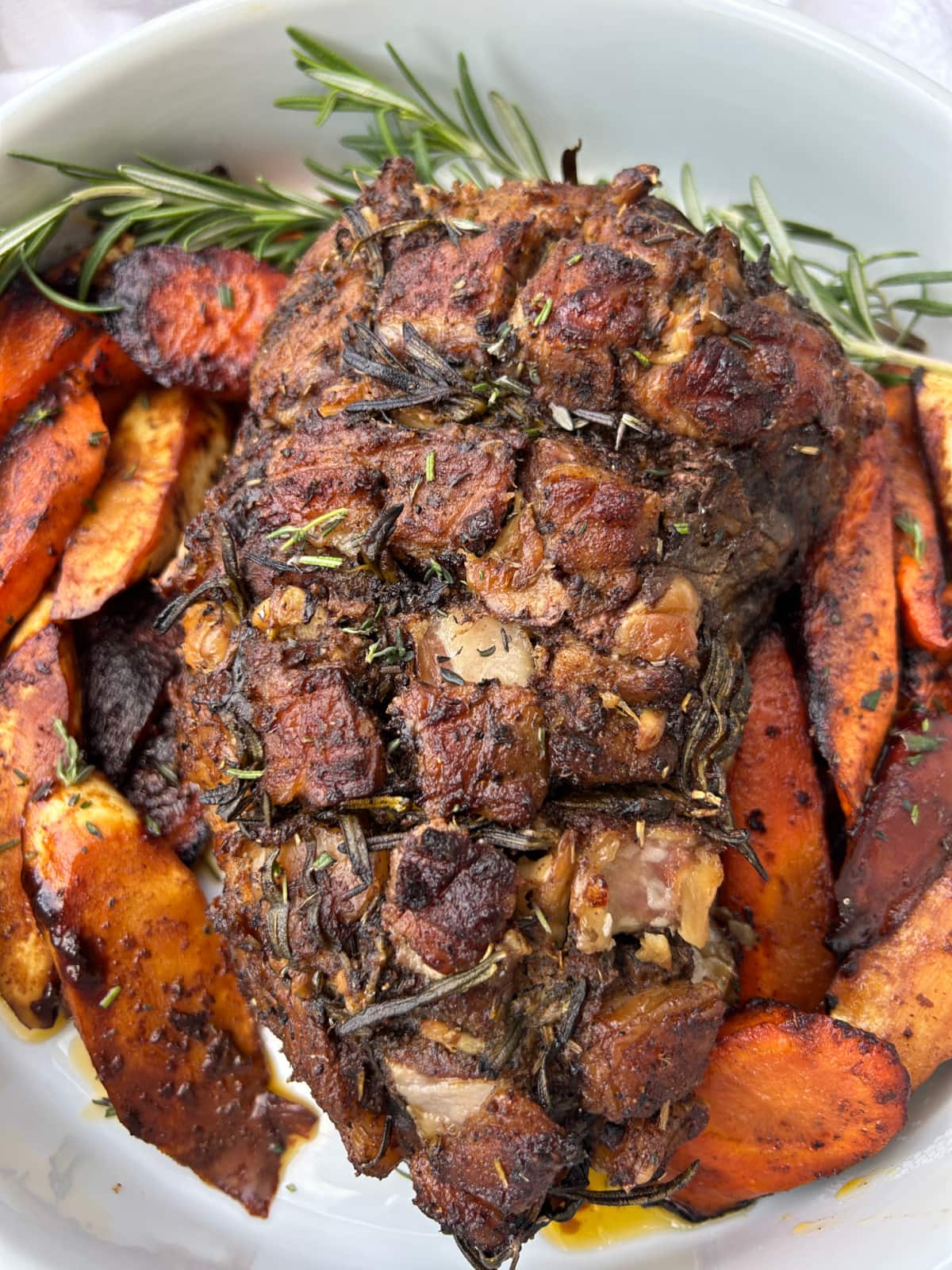
What is Lamb Roast?
As the name suggests, a boneless leg lamb roast is a cut of lamb meat that comes from the leg of the lamb that has had the bone removed. This makes it easier to carve and serve, and also allows for more even cooking. It has a rich, slightly gamey flavor that is distinct from other meats like beef or pork. The flavor can be influenced by the seasonings and herbs used to cook the lamb. For this recipe, I used garlic, rosemary, salt and pepper. I’ll be making this for Easter dinner this year, along with our favorite side dishes.
Boneless vs Bone-In
While some will argue that bone-in is the only way to go with lamb, I prefer boneless for a few reasons. A boneless leg of lamb is easier to carve and fits in the roasting pan a lot easier. It also cooks faster and yields more meat. Boneless doesn’t have as intense of flavor (lamb tends to have more of a wild game flavor than beef or pork). The right seasonings and prep is important to bring out the delicious flavors that lamb meat has to offer.
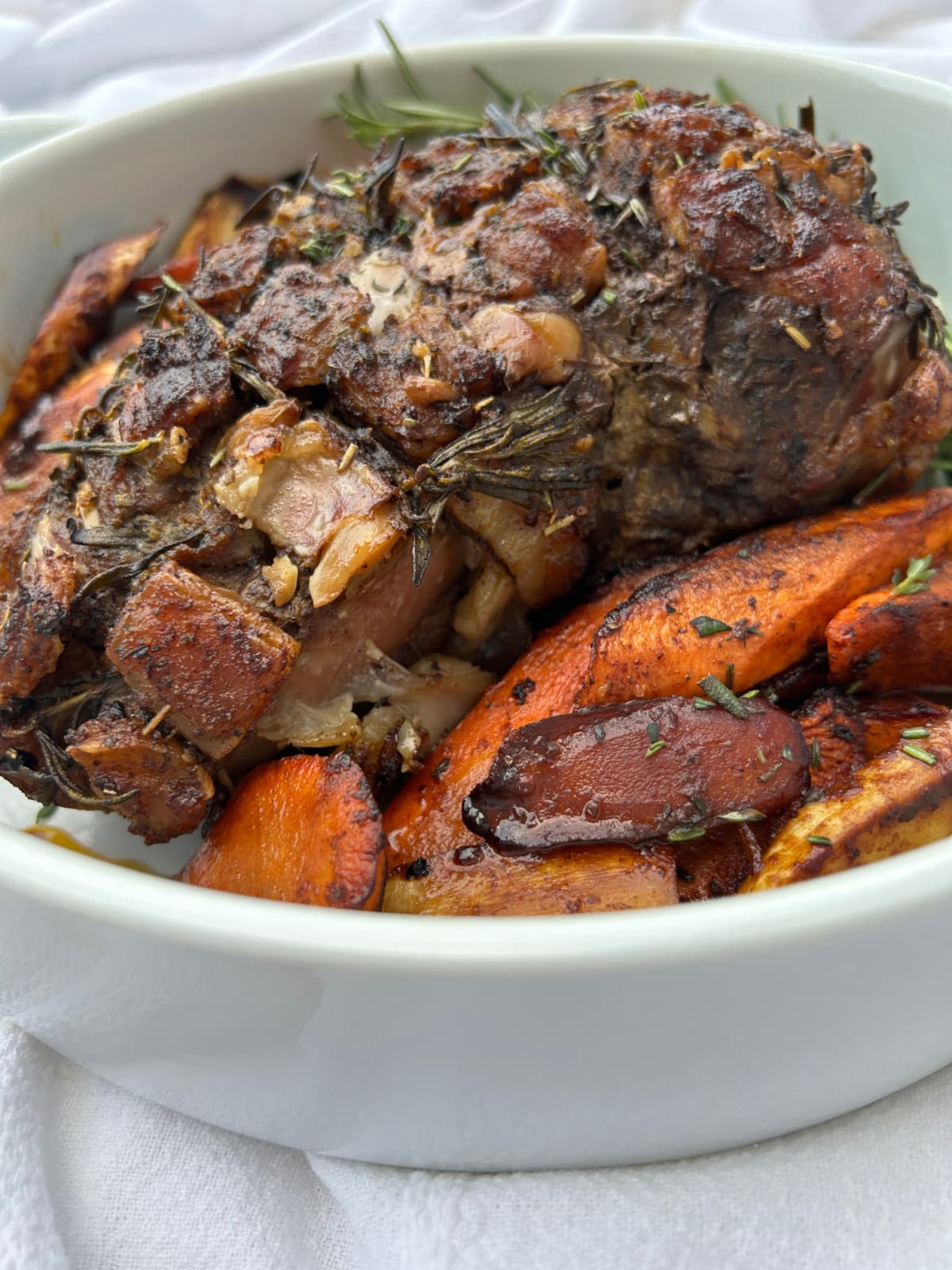
How to Cook a Boneless Leg of Lamb Roast
For full recipe details, including ingredients needed and measurements, see the printable recipe card down below. Here is step by step what you can expect when cooking a Lamb Roast:
Preheat Oven + Remove Packaging from Roast
Preheat oven to 325° F. I prefer a Roasting Pan with Rack, like this one for this recipe. Remove lamb roast from packaging and remove the stretchy string netting if included. Set netting aside for later use. Pat lamb dry.
Score the Fat Side of the Roast
Using a paring knife, carefully score the top of the meat (fat side) by cutting slits (deep enough for your garlic pieces), making a uniform design (like a diamond pattern).
Rub Oil and Seasoning
Rub roast in olive oil, then generously salt and pepper entire roast. Sprinkle with other desired seasonings. I used this Kirkland No-Salt Seasoning (which they seem to have discontinued for now – BOO!) that has – well, everything but salt and is AMAZING!! Feel free to season with whatever herbs and spices your little heart desires. Lamb can handle just about anything.
Add Garlic and Rosemary into the Slits
Place roughly chopped garlic pieces and then rosemary sprigs into each slit. Add as much as you can, depending on how many you have and how large they are.
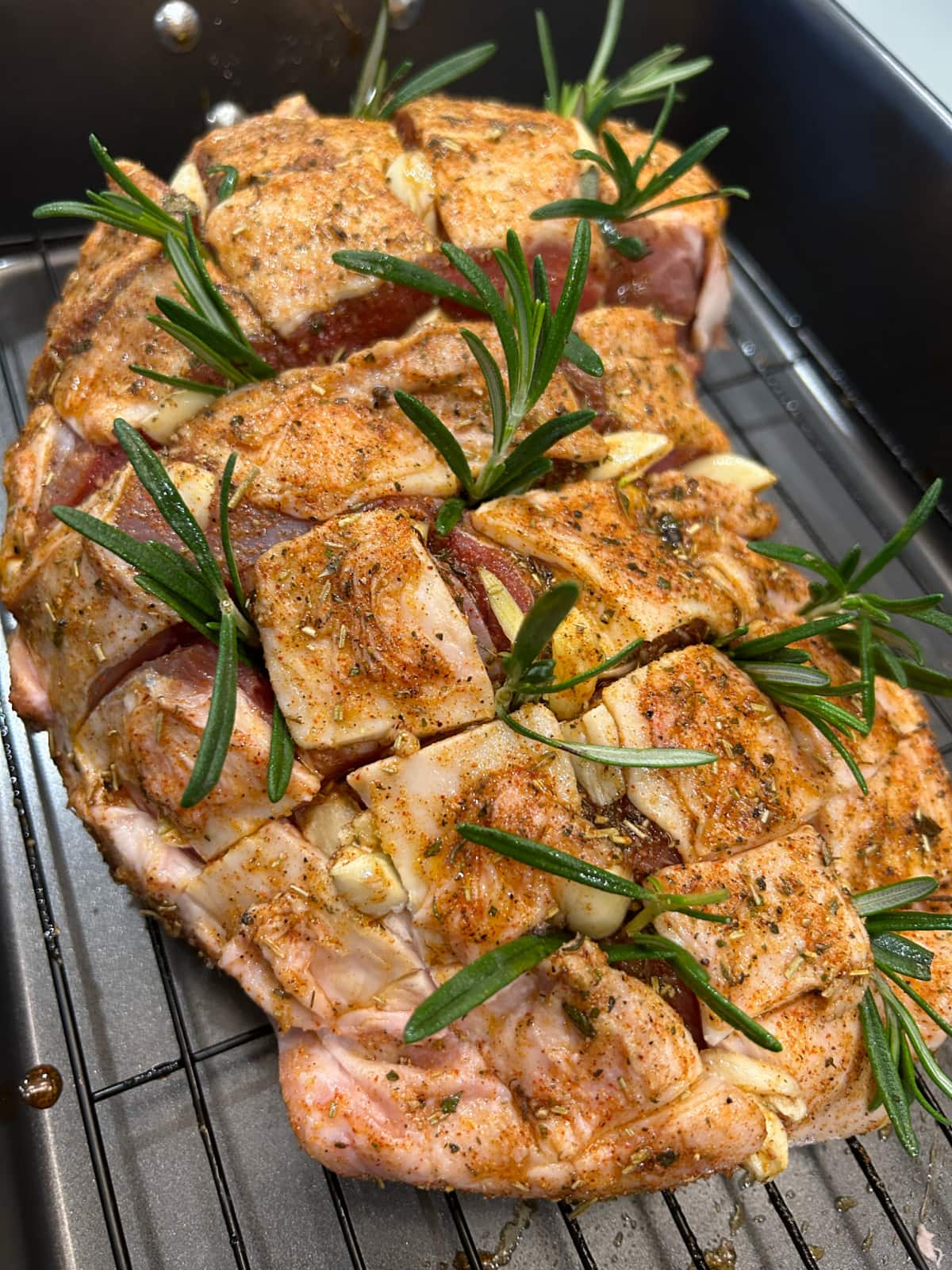
Place Netting Around Roast to Retain Shape
Gently place string netting back around the lamb leg or tie with butcher twine to retain its “roast” shape. Place lamb directly on roasting pan rack, fat side up.
Pour the chicken broth into the bottom of the roasting pan to prevent juices from burning.
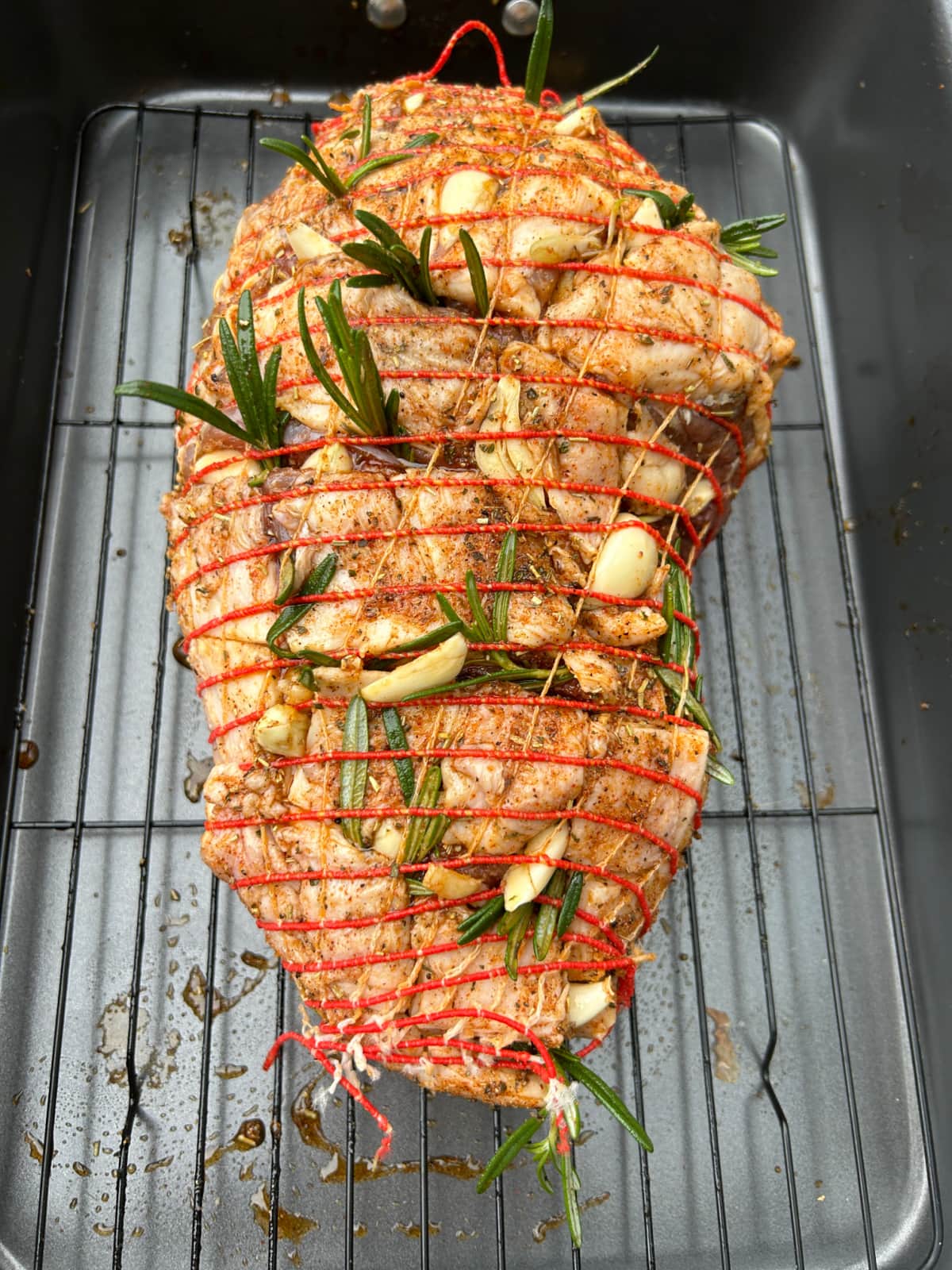
Bake + Let Rest
Bake uncovered for about 2 hours* or until internal temperature reaches 170° F.
*Bake for about 30 minutes per pound for fall apart tender results. Let rest for 15 minutes before shredding/slicing. Serve with pan juices.
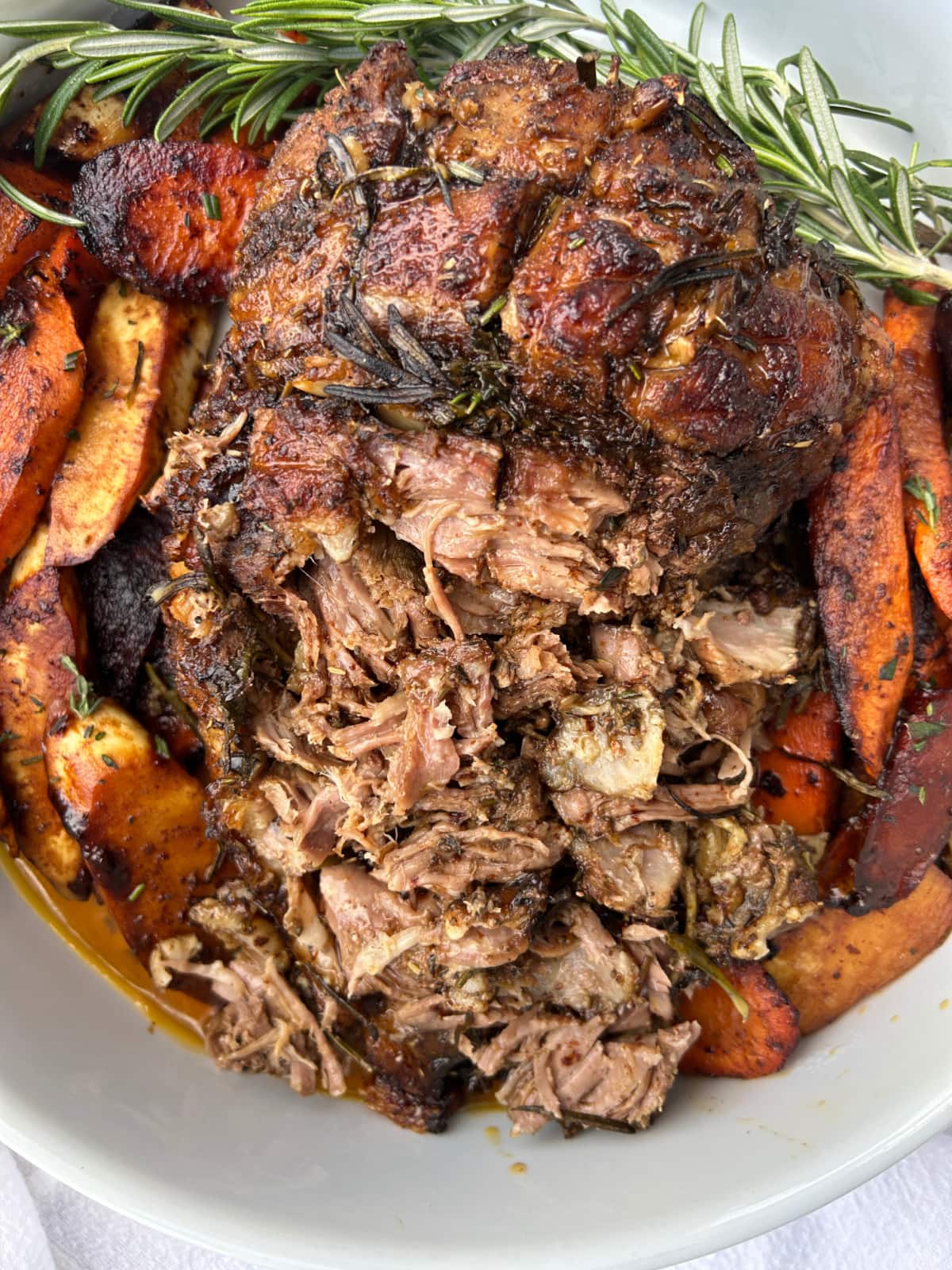
Internal Cooking Temps for a Boneless Leg of Lamb
It’s important to cook your leg of lamb to the correct temperature to ensure that it’s safe to eat and that it has the desired level of doneness. While I prefer mine to be well done and falling apart, you may prefer it a little less done. Here are the recommended cooking temperatures for boneless lamb leg:
- Rare: 125°F (52°C) – 130°F (54°C)
- Medium-rare: 130°F (54°C) – 135°F (57°C)
- Medium: 135°F (57°C) – 140°F (60°C)
- Medium-well: 145°F (63°C) – 150°F (66°C)
- Well-done: 150°F (66°C) – 170°F (71°C)
It’s important to note that these temperatures are just a guide and may need to be adjusted based on the size and shape of the lamb roast, as well as the desired level of doneness. It’s always best to use a meat thermometer to check the internal temperature of the lamb roast and ensure that it’s cooked to your liking. Remember to let the lamb rest for 10-15 minutes before carving to allow the juices to redistribute and to make it easier to carve.
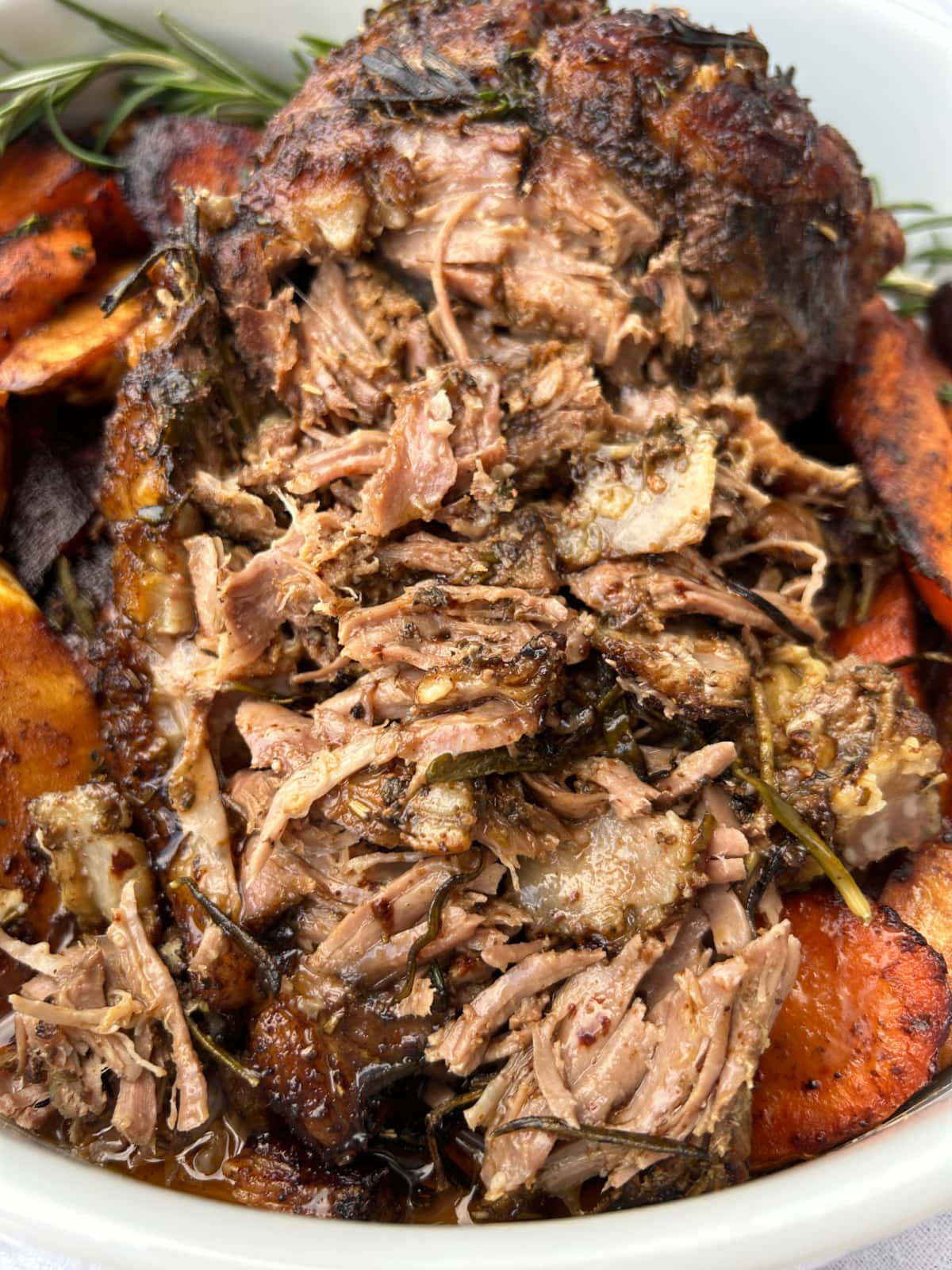
Make Ahead + Storage Directions
Make ahead: To save time during a busy day of cooking, you can stuff and season roast, cover and refrigerate for 24 hours. Then let it come to room temperature and roast as the recipe directs.
Refrigerate lamb roast leftovers: Allow to cool completely. Store as a whole roast or pulled apart in an airtight container for up to 5 days.
Freeze: Freeze leftovers pulled apart or sliced in an airtight container for up to 3 months. Thaw in fridge and then use leftovers as a protein in a salad or on-the-go sandwich.
More Easter Dinner Recipes to Consider!
- Amazing Baked Ham
- Pineapple Glazed Ham
- Funeral Potatoes
- Fondant Potatoes
- Maple Glazed Carrots
- Carrot Cake
- Cadbury Egg Cookies
- Deviled Eggs
There you have it! Pretty easy, right? While the lamb roast is roasting, you have time to prep side dishes! Have a wonderful day, friends! 
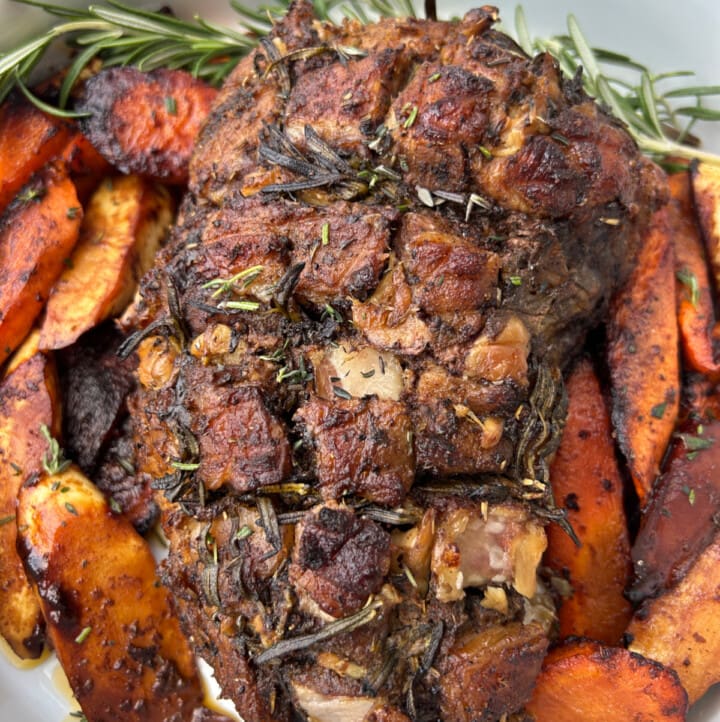
Lamb Roast
Equipment
Ingredients
- 2-3 lb boneless lamb leg
- 2 tbsp olive oil
- 1 tbsp salt
- 2 tsp black pepper freshly ground
- 1 tbsp no-salt seasoning or your choice of herbs and spices, like dried rosemary, paprika, garlic powder, etc.
- 4 large garlic cloves roughly chopped
- 4 sprigs rosemary fresh
- 1 cup chicken broth or vegetable
Instructions
- Preheat oven to 325° F.
- Remove lamb roast from packaging and remove the stretchy string netting if included. Set netting aside for later use. Pat lamb dry with towel.
- Using a paring knife, carefully score the top of the meat (fat side) by cutting slits (deep enough for your garlic pieces), making a uniform design (like a diamond pattern).
- Rub entire roast in olive oil.
- Generously salt and pepper entire roast. Add herbs and spices of your choice (I used Kirkland No-Salt Seasoning).
- Place roughly chopped garlic pieces into each slit.
- Place rosemary sprigs into as many slits as you can, depending on how much you have/how large they are.
- Gently place string netting back around the lamb leg or tie with butcher twine to retain it's "roast" shape.
- Place lamb directly on roasting pan rack fat side up.
- Pour the chicken broth into the bottom of the roasting pan to prevent juices from burning.
- Bake uncovered for about 2 hours* or until internal temperature reaches 170° F. *Bake for about 30 minutes per pound for fall apart tender results.
- Let rest for 15 minutes before shredding/slicing. Serve with pan juices.
Notes
Nutrition
The post Lamb Roast appeared first on Lauren's Latest.
